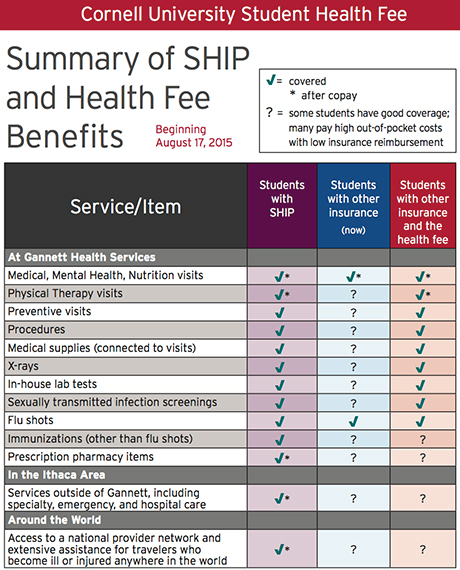University responds to student health fee questions
More information
Visit the Caring Community website for an in-depth FAQ and charts of examples of how the health fee will apply to medical costs.
Since President David J. Skorton’s announcement Feb. 5 that Cornell would implement a new funding model for student health services, students and parents have raised questions about the new $350 annual health fee. More than 100 students occupied Day Hall to protest the fee Feb. 9, and Vice President for Student and Academic Services Susan Murphy issued a statement Feb. 11 clarifying the decision.
“The university student health fee introduced last week understandably has created concern for some students and their families,” said Murphy. “However, the fee is necessary to create a sustainable model for health services while also increasing accessibility and protecting student privacy.”
According to Murphy: “At the peak of the university’s financial crisis, we made the decision to increase services at Gannett in the wake of two major public health crises as well as growing enrollment and demand. There was not sufficient permanent funding available to pay for those expanded services, so we relied initially on gifts and reserves, and then borrowed funds internally to cover the costs. We now must resolve the funding issue, including paying back those borrowed funds so they can be used elsewhere.”
She said that without the temporary funding – and beginning next year, the fee – the university was faced with either charging students significantly more for each visit or cutting services. “Neither option is acceptable. Charging more would increase barriers to access; and cutting staffing, in the face of growing demand and student enrollment, would be irresponsible,” Murphy said.
Under the new model, she said, everyone will participate in supporting campus health. Funding sources will include central university resources and contributions from all students – students on SHIP through a portion of their premium, and other students through the health fee.

Parents have questioned why they need to pay a fee when they are satisfied with the coverage their insurance plans provide.
“The new funding model allows us to continue essential programs related to prevention, public health, regulatory compliance and crisis response,” said Murphy. “It also provides a ‘safety net’ of services – regardless of individual student insurance coverage – that addresses important concerns for the entire campus community, including communicable disease, sexual health, mental health, and alcohol and other drug use.”
Students come to Cornell with more than 1,000 different insurance plans from across the country, with increasingly regionalized and restrictive provider networks that make it infeasible for Gannett to contract with many of them. According to officials, even if Gannett could contract with most insurance plans, average student out-of-pocket costs would increase due to rising copayments, coinsurances and deductibles, worsening financial barriers.
The new funding model will provide equitable access to care on campus, officials say. Students on SHIP already have low-cost access to campus health services paid through their premium. With the health fee, students with other insurance also will have low-cost access, paying only a $10 copayment for each visit at Gannett; most other charges associated with the visit (for example, in-house lab tests, X-rays and procedures) will be covered fully with no out-of-pocket costs (see chart). Students will not need to file insurance claims for covered Gannett services, such as tests for sexually transmitted infections, improving student confidentially.
A health fee advisory committee of students, faculty and administrators will be formed to “function much like the Student Insurance Advisory Committee does for the insurance plan, providing guidance to balance needs and costs each year,” Murphy said.
“It is our responsibility to work together, to make sure everyone in our community who needs help gets it. That is a burden, and a benefit, we all share,” she said.
Media Contact
Get Cornell news delivered right to your inbox.
Subscribe